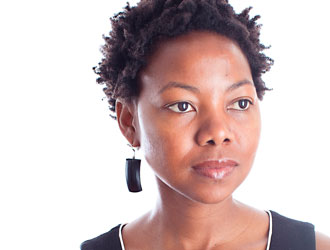By Judith Rosen | PW

Photo by Smeeta Mahanti
“We are on our way to Budapest: Bastard and Chipo and Godknows and Sbho and Stina and me. We are going even though we are not allowed to cross Mzilikazi Road, even though Bastard is supposed to be watching his little sister Fraction, even though Mother would kill me dead if she found out; we are just going.”
 So begins the opening chapter of NoViolet Bulawayo’s debut novel, We Need New Names (Little, Brown/Reagan Arthur Books, May 21). The book is set in Paradise—no, not that Paradise, and not that Budapest either—a shantytown in an unnamed country resembling the Zimbabwe of Operation Murambatsvina (Drive Out the Trash), a government sponsored program of forced relocation. The book follows a gang of kids whose families have been left with nothing after their homes and belongings are taken from them and they are resettled there. Their best chance for a better life lies elsewhere: in other parts of Africa or abroad.
So begins the opening chapter of NoViolet Bulawayo’s debut novel, We Need New Names (Little, Brown/Reagan Arthur Books, May 21). The book is set in Paradise—no, not that Paradise, and not that Budapest either—a shantytown in an unnamed country resembling the Zimbabwe of Operation Murambatsvina (Drive Out the Trash), a government sponsored program of forced relocation. The book follows a gang of kids whose families have been left with nothing after their homes and belongings are taken from them and they are resettled there. Their best chance for a better life lies elsewhere: in other parts of Africa or abroad.
For the author, 31-year-old Zimbabwe native NoViolet Bulawayo, what happens to these children is personal. Bulawayo was one of the “born frees”—the generation who grew up after the U.K. granted the country (then Rhodesia) independence in 1980—and she attended school, but the relative peace of the post-independence era ended just before she emmigrated to live with her aunt in Kalamazoo, Mich., and attend college at age 18. Even in America, Zimbabwe has never been far from Bulawayo’s mind. “You don’t forget home,” she says. The name she chose for herself five years ago celebrates her family and homeland: “NoViolet” literally means “with Violet” (after her mother, who died when Bulawayo was just 18 months old); and “Bulawayo” is Zimbabwe’s second-largest city, where she grew up.
We meet at Winter Institute 8 at the Westin Downtown hotel in Kansas City, Mo. Bulawayo is here for the author reception. As we talk in the hotel lobby, executives from other publishers—including Graywolf, Random House, and Workman—try to engage her in conversation.
Her book has had a big impact already: the opening chapter was published in The Boston Review and went on to win the 2011 Caine Prize for African Writing, often referred to as the African Booker. The journal’s fiction editor, Junot Díaz, wrote, “I knew this writer was going to blow up. Her honesty, her voice, her formidable command of her craft—all were apparent from the first page.”
No comments:
Post a Comment